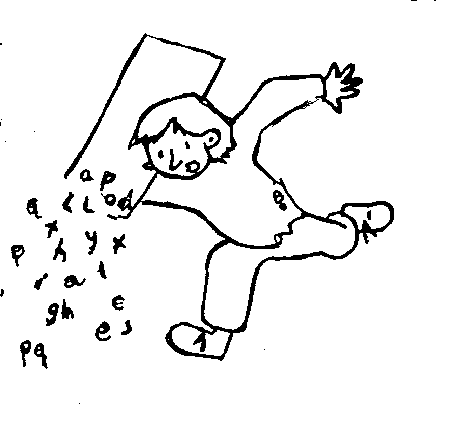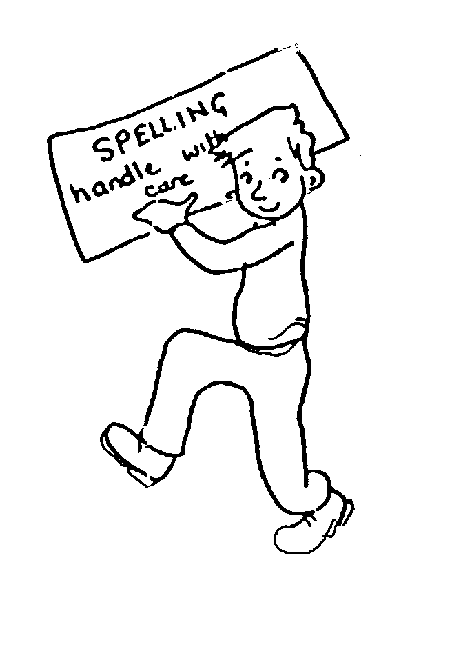What sort of spelling could be user frendly for everyone - readers, writers, learners and internationaly?Needs-driven improvements for English spelling
SEVEN PRINCIPLES TO IMPROVE ENGLISH SPELLINGSEVEN PRINSIPLS TO IMPRÙV ENGLISH SPELING
7 principles for reading that keep present spelling readable.Transitional principles 3 and 7 are not needed for writing. 1. Represent
formal unslurred
speech with broadband fonemes 2.
Consistent
phonemic spelling table for
speech sounds, including for terminal vowels, and with
name-vowels accented 3.
31 frequent
irregularly spelled words remain
as sight words, eg 4.
Consistent
spellings for grammatical
inflections eg
-s,
-d 5.
Suffixes do
not change the spelling of
word-units, e.g.
cowboy
partys 6. If
words sound
the same they are spelld the
same, unless that would really
confuse. In more detailA. The first two basic rules: -
Then these two basic rules, lernt first, are modified by five more:
Indicating StressIt may also be found to be worth-while in texts for lerners of English vocabulary, to clarify uncertain placement of stress by dubld consonants. e.g COMITTY is not the same as COMITY, and beginners may need spellings like MELLancoly. There are alredy intercontinental distinctions in many words however, such as REserch and ReSERCH, LABoratry and LaBORatry,so that it might not matter where a newcomer placed the stress. Rule 2. Spelings for speech
sounds
|
|
BAD DAD FAD GAG HAG JAG KEG LEG MEG NAG PEG QUIK |
RAG SAG TAG VAN WAG AX YEN ZEN THIS/ THIN WHICH |
CHIN SHIN SINK SING |
Tàbl 2. Vowels
The 19 vowel sounds have one spelling each, varying only for final position
|
Vowel sound |
Spelling |
|
|
|
- |
A |
bàt |
bay |
|
er air or/aw ow oy oo as in book 00 as in boot |
cart |
banana |
The unclear vowel in normal speech is the 20th English
vowel sound, and is spelled according to its pronunciation in very
formal public speaking.
* The word PERTURB shows spellings for both stressd & unstressd
sylabls.
Tàbl 3. Spelling sequences of vowels
Spellings that represent singl sounds as in the table above are in
brackets.
In most adult text, grav acsents wil not be needed
à è ì
ò ù.
|
Vowel sequences |
|
|
|
|
|
|
a. aa ae ai ao au e. ea ee ei eo eu i. ia ie ii io iu o. oa oe oi oo ou u. ua ue ui uo uu |
bazaar (stresd) ìdea creàt clear dìal spesial bòa oàsis dùal ùzual |
pàella (bee) dìet pòet sùet |
dàis bèing flìing gòing (boil) flùid |
càos èon/creòl ì ota milion (boot) dùo |
taut) hideus pìus impius (bout) inocùus |
That is, there are no clumsy three-letr sequences for sequences of vowel sounds.
Dictionaries can use these principles for consistent pronunciasion keys. These keys will almost always be identicl with standard Faster Spelling, while still closely resembling present spelling. The exepsions are for long vowels with mor than one posibl spelling, and a few 'exeption words'.
Learners could start with the first two rules for what American educator Kate Gladstone calls a 'Quick Start Written English' - analogous to the 'quick start' introductory pages at the beginning of computer manuals: enough to get you started as a user, so that you can do some important things, and then you can go on to learn the remainder of the material as your needs demand'. The sequence of six rules than makes what Gladstone would call a 'firm, orderly 'bridge' for sure progress.
There is now incontrovertible published evidence that at present
English spelling is a great handicap for literacy compared with
spelling systems that have been improved in other languages within
the past 150 years. The problem is that at present English spelling
has hundreds of rules, and most rules have exceptions. Spelling has
to be learnt word by word.
Mor exampls: -
|
And I was fild with such delìght As prisond birds must fìnd in freedom Winging wìldly acros the whìt Orcherds and dark green fèlds, on - on - and out of sight. (Sassoon) |
ther wer no sounds no cars no birds only mi clok tiking |
|
a stàtly plesur dòm decree, where Alph the sàcred river ran thru caverns mesùrless to man doun to a sunless sea. (Coleridge) |
Pòetry is unintelijabl pròz in bròken lìns sò thay say ~~~~~~~~~~~~~~ |
|
Pity the poor rèders. If ther wer a speling that was predictabl would u stop it? If it left u say 30 very comon iregùlerly speld werds? - for tlernrs can manaj that. It is the present 1000s of unpredictabl spelings that ar the briars to kèp them out, that ar the thej to protect u from ùniversal literasy, the enchanter's spel of speling |
An Initial Learning Spelling that turns into Real Spelling
First lern Two Rules and then add four more.
Dr Steve Bett describes this stratejy as 'starting with phonetic English and deconstructing it by the addition of exception rules.' Then by the aplication of the exception rules, a person can read and write something close to traditional English, but without its great difficulties and burden on the memory.
 |
|
Back to OzIdeas Spelling index page
Back to Ozideas Home Page
